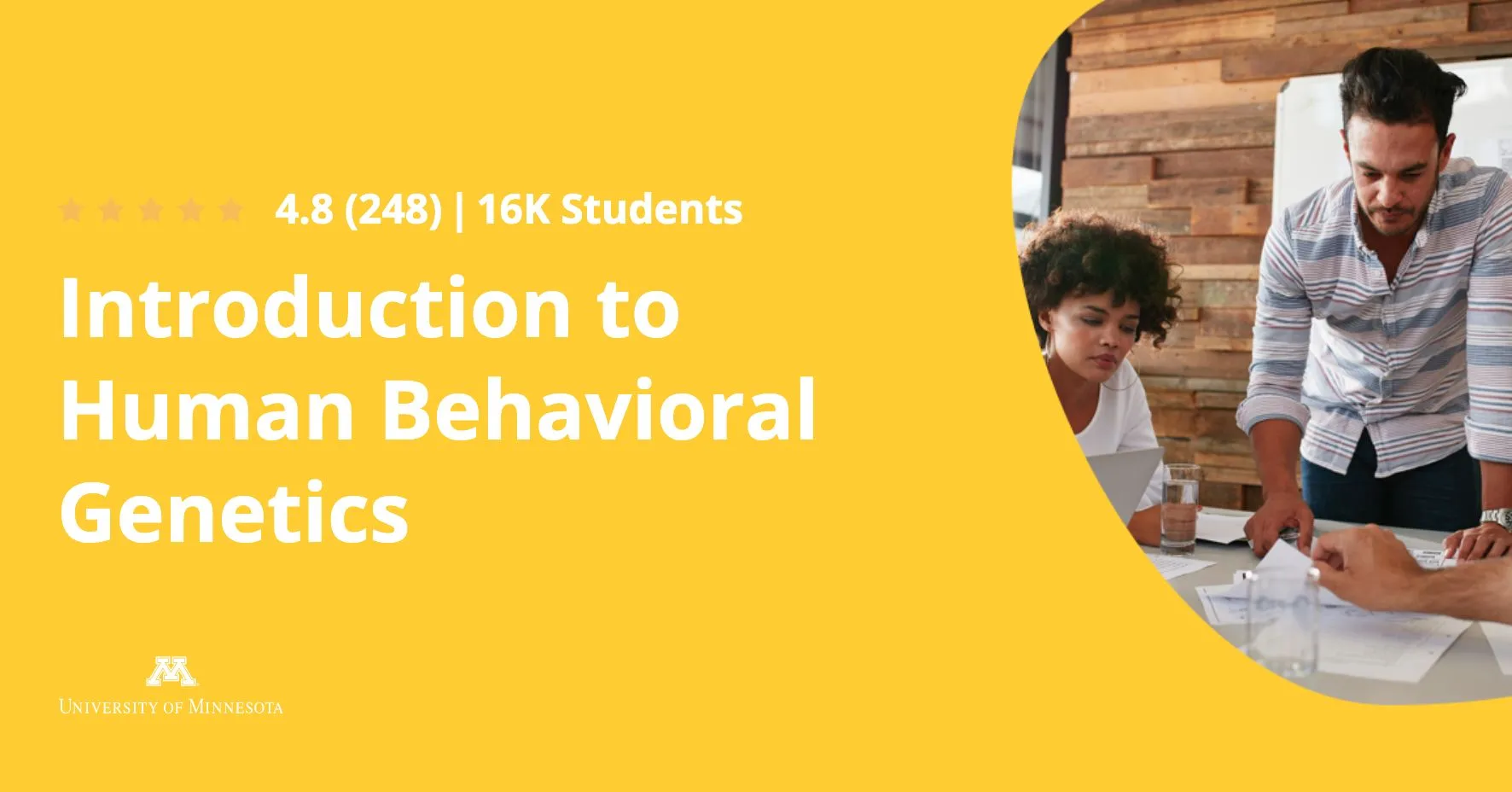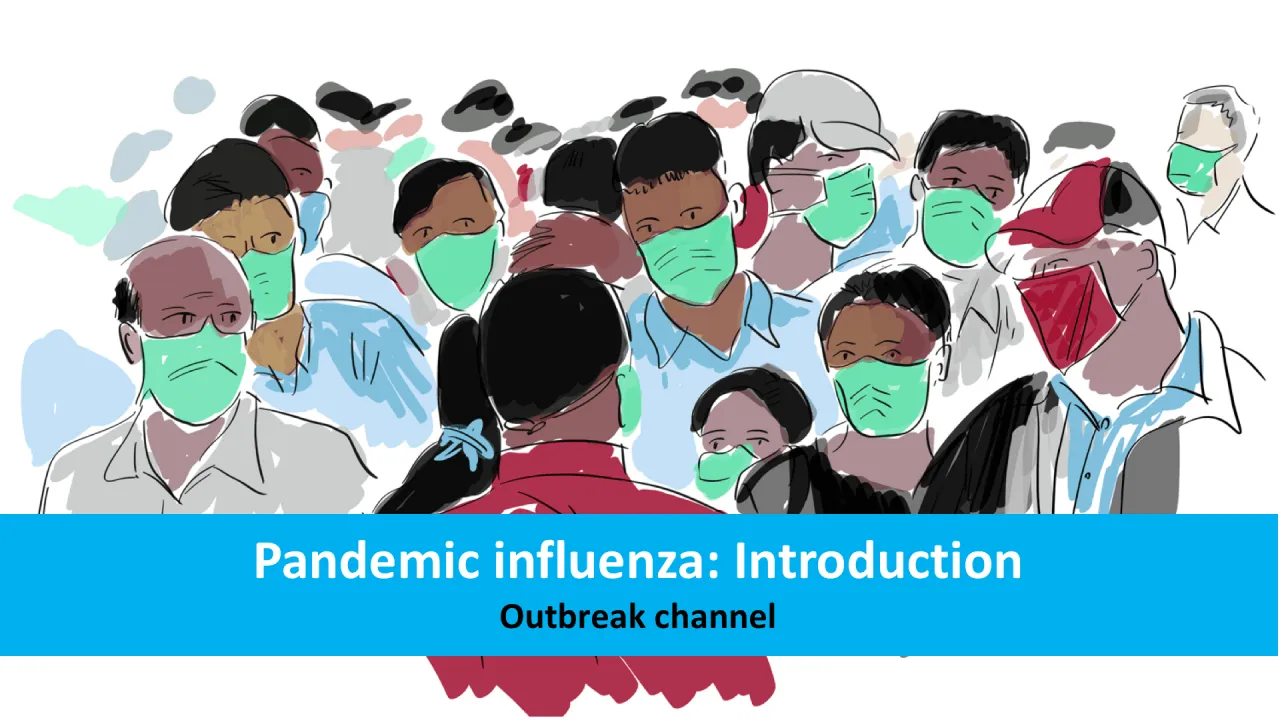
Introduction to Human Behavioral Genetics 
This course provides an overview of the field of human behavioral genetics, exploring the use of twin and adoption studies, as well as DNA analysis, to investigate the genetic basis of individual differences in behavior. ▼
ADVERTISEMENT
Course Feature
![]() Cost:
Cost:
Free
![]() Provider:
Provider:
Coursera
![]() Certificate:
Certificate:
No Information
![]() Language:
Language:
English
![]() Start Date:
Start Date:
Self Paced
Course Overview
❗The content presented here is sourced directly from Coursera platform. For comprehensive course details, including enrollment information, simply click on the 'Go to class' link on our website.
Updated in [March 06th, 2023]
Learners can learn about the nature-nurture debate and the founding of behavioral genetics in this course. They can explore the implications of the John/Joan case and the eugenics movement, and gain an understanding of the genetic basis of phenylketonuria (PKU) and Huntington Disease. Through the office hours video, learners can gain a deeper understanding of the topics covered in the course and ask questions to the instructor. This course provides learners with a comprehensive overview of the field of behavioral genetics, and the knowledge and skills to apply it to their own research.
[Applications]
After completing this course, students can apply their knowledge of human behavioral genetics to a variety of fields. For example, they can use their understanding of the nature-nurture debate to inform their research in psychology, sociology, and anthropology. They can also use their knowledge of the eugenics movement to inform their research in history and public policy. Additionally, their understanding of the John/Joan case and diseases such as PKU and Huntington Disease can be applied to their research in medicine and healthcare.
[Career Paths]
1. Genetic Counselor: Genetic counselors are healthcare professionals who provide information and support to individuals and families who have, or may be at risk for, genetic conditions. They help individuals understand and adapt to the medical, psychological, and familial implications of genetic contributions to disease. As the field of genetics continues to expand, the demand for genetic counselors is expected to grow.
2. Genetic Epidemiologist: Genetic epidemiologists use epidemiological methods to study the genetic basis of disease. They investigate the role of genetic and environmental factors in the development of diseases, and use this information to develop strategies for prevention and treatment. As the field of genetics continues to advance, the demand for genetic epidemiologists is expected to increase.
3. Genetic Technologist: Genetic technologists are laboratory professionals who use molecular biology techniques to analyze genetic material. They use a variety of techniques to identify and characterize genetic mutations, and to diagnose and treat genetic diseases. As the field of genetics continues to evolve, the demand for genetic technologists is expected to grow.
4. Bioinformatician: Bioinformaticians use computer science and mathematics to analyze and interpret biological data. They develop algorithms and software to analyze large datasets, and use this information to identify patterns and trends in genetic data. As the field of genetics continues to develop, the demand for bioinformaticians is expected to increase.
[Education Paths]
1. Bachelor of Science in Behavioral Genetics: This degree program focuses on the study of the genetic and environmental influences on human behavior. It covers topics such as the nature-nurture debate, the eugenics movement, and the John/Joan case. Students will learn about the genetic basis of various diseases, such as phenylketonuria (PKU) and Huntington disease, and how to use genetic testing to diagnose and treat them. This degree is becoming increasingly popular as the field of behavioral genetics continues to grow and develop.
2. Master of Science in Genetic Counseling: This degree program focuses on the use of genetic testing to diagnose and treat genetic disorders. Students will learn about the ethical and legal implications of genetic testing, as well as the psychological and social aspects of genetic counseling. They will also gain an understanding of the genetic basis of various diseases, such as PKU and Huntington disease, and how to use genetic testing to diagnose and treat them. This degree is becoming increasingly popular as the field of genetic counseling continues to grow and develop.
3. Doctor of Philosophy in Human Genetics: This degree program focuses on the study of the genetic basis of human behavior. Students will learn about the nature-nurture debate, the eugenics movement, and the John/Joan case. They will also gain an understanding of the genetic basis of various diseases, such as PKU and Huntington disease, and how to use genetic testing to diagnose and treat them. This degree is becoming increasingly popular as the field of human genetics continues to grow and develop.
4. Master of Science in Human Genetics: This degree program focuses on the study of the genetic basis of human behavior. Students will learn about the nature-nurture debate, the eugenics movement, and the John/Joan case. They will also gain an understanding of the genetic basis of various diseases, such as PKU and Huntington disease, and how to use genetic testing to diagnose and treat them. This degree is becoming increasingly popular as the field of human genetics continues to grow and develop.
Course Syllabus
2A: Twins: A Natural Experiment
2B: How to Assess Twin Similarity
2C: Findings from Twin Studies
2D: Are Twin Studies Valid?
2E: Adoption Studies: Not by Twins Alone
2F: Minnesota Study of Twins Reared Apart (MISTRA)
2G: Conversation with Tom Bouchard - Supplementary
Unit 2 Office Hours Video
Pros & Cons

Excellent mentor.

Interesting and challenging class.

Fascinating course with helpful readings.

No correction after tests.

Transcription errors in transcripts.

Last few weeks were in-depth and detailed.
Course Provider

Provider Coursera's Stats at AZClass
Discussion and Reviews
0.0 (Based on 0 reviews)
Explore Similar Online Courses

Pandemic influenza: Introduction

Introduction to Corporate Finance

Python for Informatics: Exploring Information

Social Network Analysis

Introduction to Systematic Review and Meta-Analysis

The Analytics Edge

DCO042 - Python For Informatics

Causal Diagrams: Draw Your Assumptions Before Your Conclusions

Whole genome sequencing of bacterial genomes - tools and applications

Biology 102: Basic Genetics

Introduction to Genetics: Certificate Program

Basic Genetics for Teachers: Professional Development
 Related Categories
Related Categories
 Popular Providers
Popular Providers
Quiz
 Submitted Sucessfully
Submitted Sucessfully
1. What is the main focus of Unit 1?
2. What is an example of a genetic disorder discussed in Unit 1?
3. What type of supplementary material is included in Unit 1?
4. What is Phenylketonuria (PKU)?
Correct Answer: It is an inherited disorder that causes an amino acid called phenylalanine to build up in the body.


Start your review of Introduction to Human Behavioral Genetics